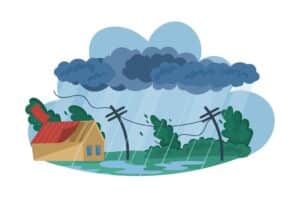Keeping track of all the taxes that you must pay is an important part of selling a Nevada house. At Priority Home Buyers, our experts can help you organize your real estate taxes while ensuring that the deal closes smoothly.

For those selling a house for the first time, the taxes incurred from a Nevada home sale can seem daunting. After all, no one likes to be visited by the Internal Revenue Service (IRS).
To help you navigate the taxing world of real estate taxes, we have created this thorough guide :)
Let’s explore the various taxes incurred on the sale of a house in Nevada, and how you can reduce your tax burden to maximize your profits.
How Capital Gains Taxes Work Nevada
While selling a house in Nevada, the primary tax that you must deal with is the Capital Gains Tax. To be concise, Capital Gains Tax is a fraction of the profit you make after selling real estate, stocks, machinery, or bonds.
This taxable value is calculated by subtracting the cost basis from the total selling price. Here, the cost basis is the sum of the original purchase price and ownership expenses.

Let’s simplify this further with an example. Let’s say that you purchased a home for $100,000 a few years ago, the selling price of which has inflated to $180,000 today. During your time as the owner, let’s say you spent $20,000 in maintenance and various home improvements.
Additionally, you may also add closing costs and settlement costs that every Nevada homeowner must pay while selling their property. Let us assume that this value is $20,000.
Now, we can calculate the cost basis by adding the initial purchasing price with the cost of capital improvements, legal fees, and closing costs. This returns $140,000 as the cost basis.
Using this value, we can now find out the amount of Capital Gains Tax that you owe by subtracting $140,000 from $180,000. Thus, the taxable amount is $40,000 for this particular example.
Capital Gains Tax is only incurred when someone sells an asset. This is to say that so long as you remain the owner of said asset, you don’t need to pay the tax.
Additionally, if you don’t sell the Nevada property for a profit, you will not have to pay Capital Gains Tax.
Short-Term And Long-Term Capital Gains Tax Nevada
The tenure of ownership directly affects the amount of payable Capital Gains Tax. Based on this tenure, the IRS has classified the tax into Short-Term and Long-Term Capital Gains Taxes.
If you have owned a Nevada property for a year or less before closing the deal, the home sale profit will incur a short-term Capital Gains Tax amount. Based on your gross income and tax-filing status, the payable amount can vary greatly. At its highest, the payable amount can be 37% for high-income households.
Conversely, if you’ve owned the property for over a year before selling it, the profit made will be considered a long-term capital gain. Compared to short-term capital gains taxes, the amount payable for long-term Capital Gains Taxes is relatively low.
The amount of tax that you must pay for long-term capital gains is as follows:
| Qualifying Individuals | Taxable Income Range | Capital Gains Tax Rates |
| Single Or Married Couples Filing Separately | $0-$41,675 | 0% |
| Head Of The Household | $0-$55,800 | 0% |
| Married People Filing Jointly | $0-$83,350 | 0% |
| Single | $41,675-$459,750 | 15% |
| Married Couples Filing Jointly Or Qualified Surviving Spouse | $83,350-$517,200 | 15% |
| Head Of The Household | $55,800-$488,500 | 15% |
| Married People Filing Separately | $41,675-$258,600 | 15% |
Note: If the amounts above exceed the upper limit of the 15% bracket, then the homeowner must pay 20% of the profit as Capital Gains Tax. This is applicable to all kinds of homeowners with no exceptions.
Capital Gains Tax Relief Nevada
If you meet certain criteria, you may be able to avoid Capital Gains Tax in Nevada entirely.
As per the Taxpayer Relief Act of 1997, you can qualify for tax relief of up to $250,000 if you file as a single person. For married couples or the surviving spouse, this relief extends up to $500,000.
The criteria to meet for the maximum tax deductions are as detailed below.
1. Ownership Requirement
Before selling the Nevada property, you must own it for at least two years to qualify for the tax exemption.

For married couples, this restriction is a little more stringent, as both members of the couple need to fulfill this criterion to receive the full exclusion. If only one spouse meets the exclusion requirement, they will qualify for a $250,000 exemption, which is half the relief amount.
2. Residential Requirement
In addition to the ownership requirements, you must meet the “2-out-of-5-year” rule.
This rule dictates that you must have lived in the property for two years or more in the past five years. That said, you needn’t reside in the house for two continuous years.
Note that this rule may not apply if you or your spouse fall into one of the following categories:
- You served in the military, police, or peace corps while being the homeowner
- You have partially or fully converted the property into a commercial or rental one
- You are selling the home in a 1031 exchange after purchasing it years prior
3. Lookback Requirement
Nevada homeowners may be eligible for tax exclusion if they have yet to claim the tax break for two years or less. So, if you have not claimed a tax break in the past couple of years, you may be eligible for capital gains exclusion.
Partial Exemption For Capital Gains Tax Nevada
You can claim a tax shield even if you sell the property after having owned it for a year or less. The Taxpayer Relief Act dictates that the longer you live in a property, the higher the applicable tax shield percentage.
So, for example, you can be eligible for a 25% tax shield if you sell the property after living in it for six months. Factoring in the short-term Capital Gains Tax rate, you will be able to claim a sizable relief.
The same applies to the long-term Capital Gains Tax rate in Nevada, with you gaining a higher tax shield percentage based on the ownership tenure.
How Capital Gains Tax Applies To Different Properties Nevada
Capital Gains Tax applies differently to different kinds of properties. For instance, the payable tax amount for Nevada residential properties is vastly different from that of an investment or rental property.

Needless to say, it’s important to learn about these differences before you close the deal. What follows is a brief overview of how Capital Gains Tax applies to various types of properties.
1. Investment Properties
If you’re selling a property you purchased for investment purposes, then the terms of Capital Gains Tax differ slightly.
As dictated by the Tax Cuts And Jobs Act of 2017, a mortgage interest amount of up to $750,000 can be eligible for exemption. This applies to principal residences and vacation homes, but there is a slight catch here. If the property is being used solely as an investment property, then it will not be eligible for any Capital Gains Tax exemptions.
Under the 1031 exchange, deferrals of this tax are allowed for such properties, provided that the home sale proceeds are used on a similar investment venture. In other words, if you use the money earned from the sale of the investment property, you will not be able to benefit from the exemption law.
2. Rental Properties
Rental properties are typically rented to others with the aim of generating a passive income or profit. Such properties often see an overlap with vacation homes, as homeowners typically convert theirs to rental properties when it is not in use.
Note that a Nevada rental property is considered to be an investment property if it is used by the homeowner for fewer than two weeks per year. Additionally, if the property is rented out for 15 days or less, the rental income generated in those days is not reportable.
Your rental property must abide by the IRS Ownership and Use rules to benefit from Capital Gains exclusions. That said, if the property is a second home, it may not be suitable for a 1031 exchange.
Reducing The Capital Gains Tax Amount Nevada
In addition to the exclusions discussed earlier, there are many other instances where you can reduce or outright avoid paying taxes in Nevada.
Let’s discuss these situations briefly to see how you can maximize the profits made after selling a property.
1. Cost Basis Adjustment
Adjustments to the cost basis can be a good last-minute effort to reduce your overall Capital Gains Tax amount.
You can approach this by including the settlement fees and expenses that were associated with the purchase of the home. Aspects like home improvements and any additions to the structure can help you adjust the cost basis and thus reduce the payable tax bill.
2. Converting A Second Home Into The Primary Residence
Since second homes are not eligible for Capital Gains exclusion, many people convert them into primary residences to meet the eligibility criteria.
This is a slightly long-term strategy, which needs the homeowner to live in their second home for two years to fulfill the exemption requirement. Once they meet the requirement, they put the second home up for sale.

According to the Housing Assistance Tax Act of 2008, the exemption will only apply to the period when the property was being used as the primary residence. This is to say that the second home, while it was a rental property prior to the owner’s move-in, falls under non-qualifying use.
3. Using 1031 Exchanges
As mentioned earlier, a 1031 exchange or a like-a-kind exchange is a transaction where the profits earned from a property sale are reinvested into a similar property. This means that the seller may not be able to use the profit for a venture functionally different from the sold property to qualify for tax benefits.
Like-a-kind exchanges can help reduce the tax amount, as the tax on the profits earned is deferred instead of eliminated. This is particularly beneficial for those who routinely invest in business properties and seek as many tax benefits as possible.
Note that 1031 exchanges are applicable to business or investment purposes only. Moreover, the reinvestment of the earned profit must take place within 180 days of the sale. The party involved in the exchange must also provide details of the replacement property within 45 days of the sale.
Furthermore, the American Jobs Creation Act of 2004 dictates that the exclusion applies only if the post-exchange property was held for five years or more. This was created to ensure that like-a-kind exchanges would not be misused to evade the Capital Gains Tax.
It’s important to note that the IRS has issued a memo that lists the steps of shielding a second home from the Capital Gains Tax. There are plenty of hoops for the seller to jump through, but the possibility of gaining benefits through a 1031 exchange is present.
The criteria for shielding second homes from capital gains are as follows:
- The owner must have owned the property for two years or more
- The property must have been rented for 14 days or more within the past two years
- The owner must not use the property for more than 14 days or 10% of the rental duration
4. Invest In An Opportunity Zone
An opportunity zone is an initiative designed to encourage investment in economically disadvantaged areas. The purpose of opportunity zones was to create job opportunities and promote growth in such areas while providing investors with tax benefits.
You can perform a 1031 exchange with a property in an opportunity zone, after which your capital gains will be deferred. Within a five-year period, you will see an increase of 10% in your cost basis, which will continue to rise.
By the tenth year, you will be able to cash out the investment property without having to pay tax on it.
5. Harvest Tax Losses
You can gain a capital gains exemption if you incur a loss on the sale of another capital asset in the same fiscal year.

This strategy, known as tax-loss harvesting, is something that is quite common among investors with non-lucrative assets. But unlike a 1031 exchange, tax-loss harvesting is not limited to real estate but any asset.
By partaking in this strategy, investors are able to earn a large profit through the sale of the Nevada house without having to pay taxes. Thus, they can reinvest the money almost immediately and offset Capital Gains Tax entirely.
6. Unexpected Situations
Certain unexpected situations, such as a health emergency, destruction of property, or family events like divorce, can make you eligible for a Capital Gains Tax exemption.
For health emergencies, the IRL allows an exemption, provided that you lived in the residence for less than a year before selling it. This exemption also applies if a close relative of the owner is the person facing the medical emergency.
Other unexpected events that may qualify you for an exemption are:
- Natural disasters like earthquakes, hurricanes, floods, sinkholes, fires, etc.
- Destruction of personal property through man-made disasters or acts of terrorism
- Unfortunate life events like divorce, death in the family, being fired from a job, etc.
7. Installment Sales
You can reduce the taxable income from the Nevada property sale by choosing to receive the money in installments. As defined in the sales contract, you will receive the first deposit from the buyer, after which the remainder will be paid over the specified term.
Each payment made by the buyer has a principal, gain, and interest amount. Here, the only part of the payment that is taxable is the gain since the principal and interest represent the cost basis and ordinary income.
The amount of tax also depends on how long the property was held by the owner.
Reporting The Nevada Home Sale Details To The IRS
If you received Form 1099-S, then you should report the sale of a Nevada house, excluding the non-reportable details.
The form is usually delivered to you by the agency overlooking the sale, which is typically a real estate agency, a mortgage lender, or a closing company. You must fill out the form by the 15th of February, after the year the real estate transactions took place.
Here’s a brief list of non-reportable details that you must remember when filling out the form:
- Sales price lower than $250,000, if the property is the owner’s principal residence
- The buyer is a government agency, a corporation, or an exempt volume transferor
- Items marked as gifts
- Settlements of loan collaterals
- Exchange of $600 or less for a de minimis transfer
Other Real Estate Taxes Nevada
In addition to Capital Gains Tax, you are liable to pay two other taxes upon the sale of your home. These are the real estate transfer tax and property taxes.
The real estate transfer tax is a one-time payment that you must pay after the deal is closed. Depending on the jurisdiction of the state you live in and the value of the property, the tax amount may vary.
As for property taxes, they are fixed amounts that you must pay continuously over time. These are a small fraction of the fair market value of the property and, like real estate transfer taxes, can vary based on the location.

Property taxes can be as low as 0.1% or as high as 2.2%, based on the state the property is located. It’s important to note that this can vary over time as well.
FAQ
1. What are the conditions for a Nevada home sale to be tax-free?
You can avoid having to pay Capital Gains Taxes on a home sale in Nevada entirely, provided that you meet certain conditions. These conditions include the following:
- Capital gains must not exceed the defined threshold
- The seller must not have claimed Capital Gains Tax exclusion in the last two years
- The seller used the home as the primary residence for two years in the past five years
2. Do I always need to report a Nevada property sale to the IRS?
There are a couple of niche conditions where you may not have to report the sale to the IRS, as detailed in the following points:
- The sale of the property earned you excludable and non-taxable gain
- The agency overlooking the sale did not issue a Form 1099-S to you
Of course, even if both of these points apply to the sale of your Nevada property, you can choose to report them regardless.
Final Words
Understanding how taxes work and dealing with real estate are not easy tasks, especially for first-time sellers.

It’s important to keep track of all the taxes applicable to the sale, especially if the IRS is involved. But as long as you keep an eye on all the exemption guidelines and report all the non-excludable and taxable gains, the sale will proceed smoothly.
You can also minimize the amount of payable tax by checking the Capital Gains Tax relief criteria. Additionally, methods like cost basis adjustment and 1031 exchanges can help you reduce the amount even further.
With patience and an eye for detail, managing the taxes applied to the sale of a Nevada house can be simplified to a great degree.
We at Priority Home Buyers would be thrilled to handle all the details and ensure a fast, smooth, lucrative Nevada home sale for you and your family. We are available for a free consultation anytime by phone at 877-775-0988. We love to talk real estate tax strategy, and we love what we do :)
Nevada Seller Resources




